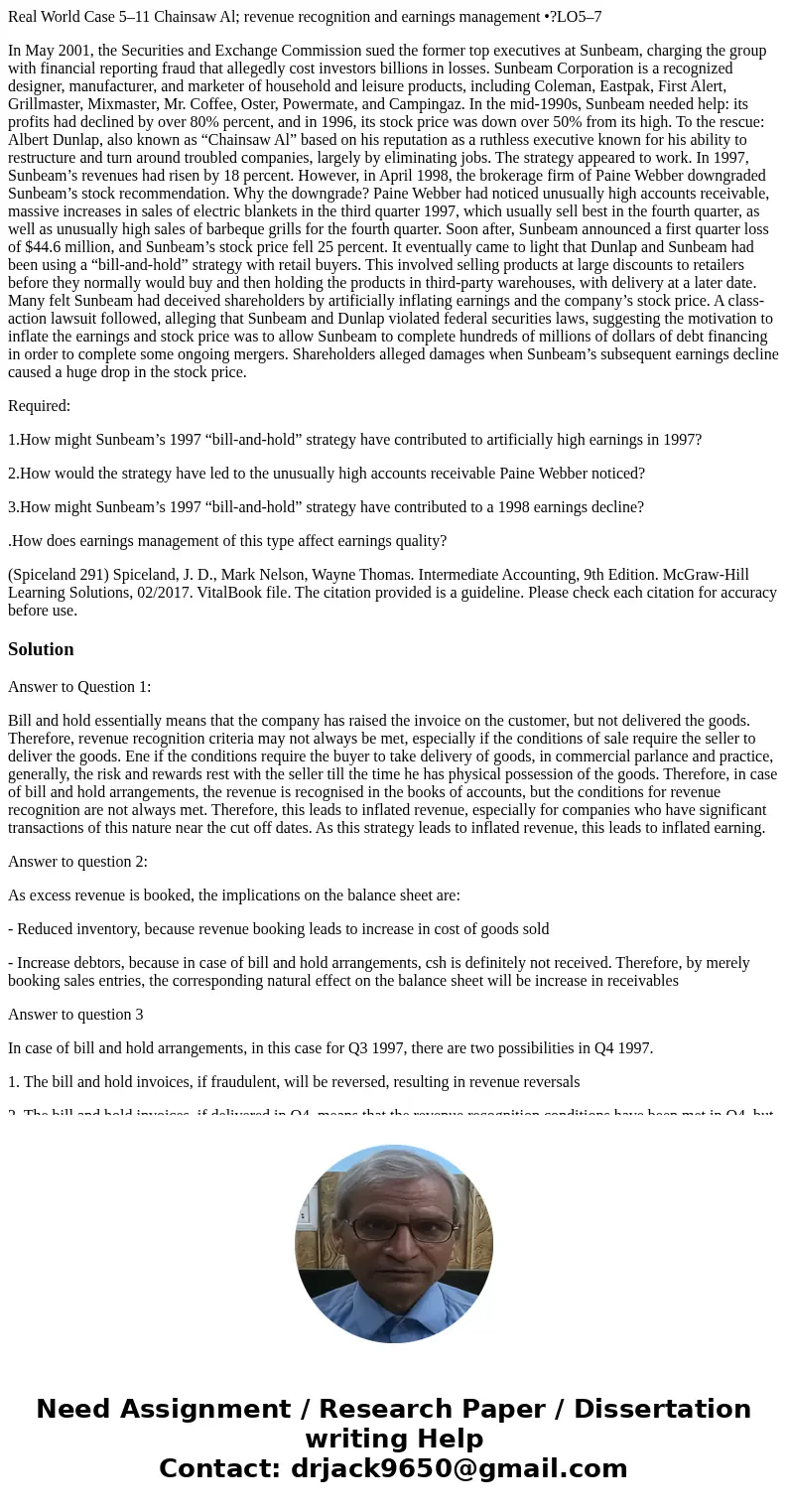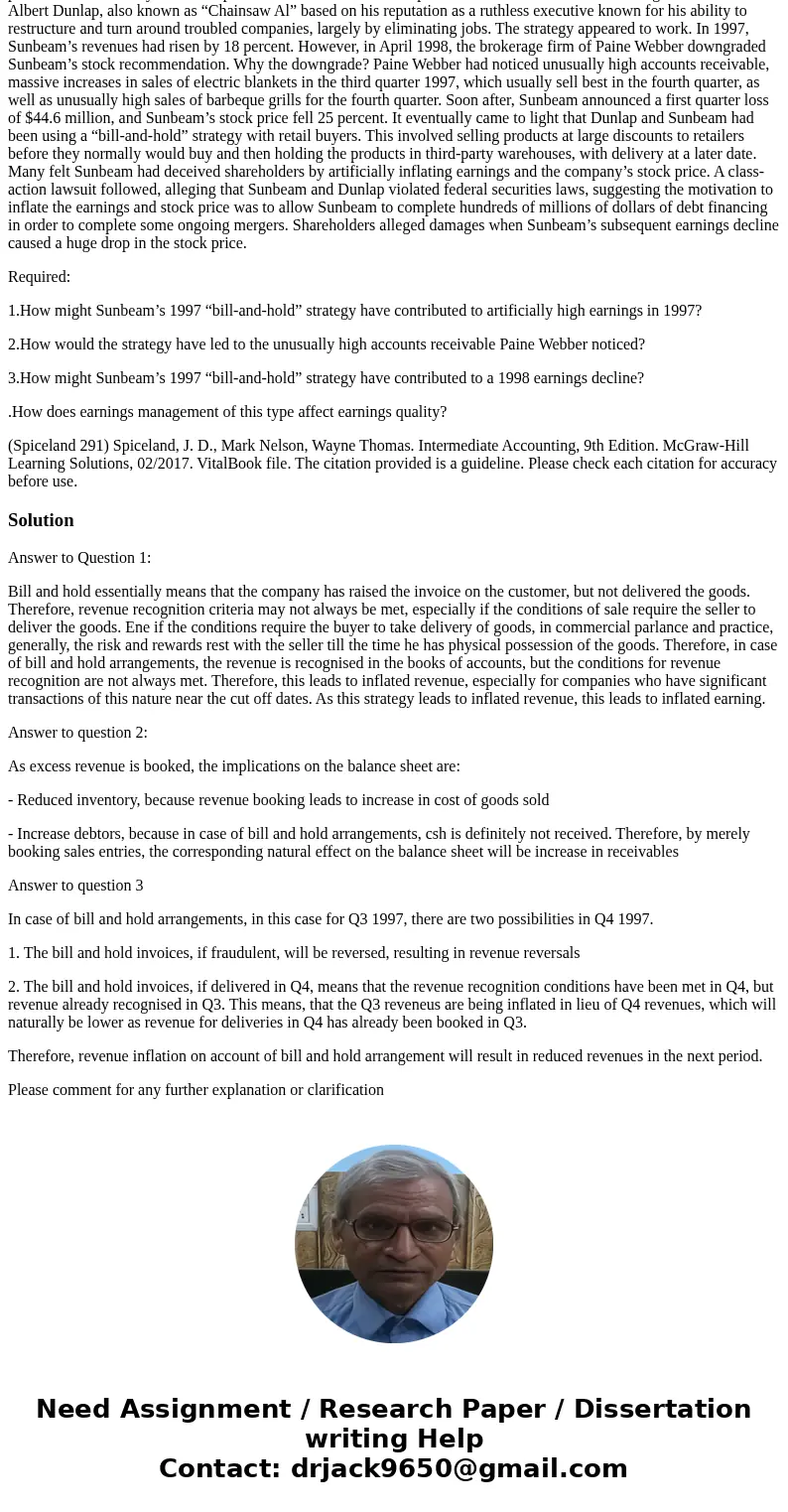Real World Case 511 Chainsaw Al revenue recognition and earn
Real World Case 5–11 Chainsaw Al; revenue recognition and earnings management •?LO5–7
In May 2001, the Securities and Exchange Commission sued the former top executives at Sunbeam, charging the group with financial reporting fraud that allegedly cost investors billions in losses. Sunbeam Corporation is a recognized designer, manufacturer, and marketer of household and leisure products, including Coleman, Eastpak, First Alert, Grillmaster, Mixmaster, Mr. Coffee, Oster, Powermate, and Campingaz. In the mid-1990s, Sunbeam needed help: its profits had declined by over 80% percent, and in 1996, its stock price was down over 50% from its high. To the rescue: Albert Dunlap, also known as “Chainsaw Al” based on his reputation as a ruthless executive known for his ability to restructure and turn around troubled companies, largely by eliminating jobs. The strategy appeared to work. In 1997, Sunbeam’s revenues had risen by 18 percent. However, in April 1998, the brokerage firm of Paine Webber downgraded Sunbeam’s stock recommendation. Why the downgrade? Paine Webber had noticed unusually high accounts receivable, massive increases in sales of electric blankets in the third quarter 1997, which usually sell best in the fourth quarter, as well as unusually high sales of barbeque grills for the fourth quarter. Soon after, Sunbeam announced a first quarter loss of $44.6 million, and Sunbeam’s stock price fell 25 percent. It eventually came to light that Dunlap and Sunbeam had been using a “bill-and-hold” strategy with retail buyers. This involved selling products at large discounts to retailers before they normally would buy and then holding the products in third-party warehouses, with delivery at a later date. Many felt Sunbeam had deceived shareholders by artificially inflating earnings and the company’s stock price. A class-action lawsuit followed, alleging that Sunbeam and Dunlap violated federal securities laws, suggesting the motivation to inflate the earnings and stock price was to allow Sunbeam to complete hundreds of millions of dollars of debt financing in order to complete some ongoing mergers. Shareholders alleged damages when Sunbeam’s subsequent earnings decline caused a huge drop in the stock price.
Required:
1.How might Sunbeam’s 1997 “bill-and-hold” strategy have contributed to artificially high earnings in 1997?
2.How would the strategy have led to the unusually high accounts receivable Paine Webber noticed?
3.How might Sunbeam’s 1997 “bill-and-hold” strategy have contributed to a 1998 earnings decline?
.How does earnings management of this type affect earnings quality?
(Spiceland 291) Spiceland, J. D., Mark Nelson, Wayne Thomas. Intermediate Accounting, 9th Edition. McGraw-Hill Learning Solutions, 02/2017. VitalBook file. The citation provided is a guideline. Please check each citation for accuracy before use.
Solution
Answer to Question 1:
Bill and hold essentially means that the company has raised the invoice on the customer, but not delivered the goods. Therefore, revenue recognition criteria may not always be met, especially if the conditions of sale require the seller to deliver the goods. Ene if the conditions require the buyer to take delivery of goods, in commercial parlance and practice, generally, the risk and rewards rest with the seller till the time he has physical possession of the goods. Therefore, in case of bill and hold arrangements, the revenue is recognised in the books of accounts, but the conditions for revenue recognition are not always met. Therefore, this leads to inflated revenue, especially for companies who have significant transactions of this nature near the cut off dates. As this strategy leads to inflated revenue, this leads to inflated earning.
Answer to question 2:
As excess revenue is booked, the implications on the balance sheet are:
- Reduced inventory, because revenue booking leads to increase in cost of goods sold
- Increase debtors, because in case of bill and hold arrangements, csh is definitely not received. Therefore, by merely booking sales entries, the corresponding natural effect on the balance sheet will be increase in receivables
Answer to question 3
In case of bill and hold arrangements, in this case for Q3 1997, there are two possibilities in Q4 1997.
1. The bill and hold invoices, if fraudulent, will be reversed, resulting in revenue reversals
2. The bill and hold invoices, if delivered in Q4, means that the revenue recognition conditions have been met in Q4, but revenue already recognised in Q3. This means, that the Q3 reveneus are being inflated in lieu of Q4 revenues, which will naturally be lower as revenue for deliveries in Q4 has already been booked in Q3.
Therefore, revenue inflation on account of bill and hold arrangement will result in reduced revenues in the next period.
Please comment for any further explanation or clarification


 Homework Sourse
Homework Sourse